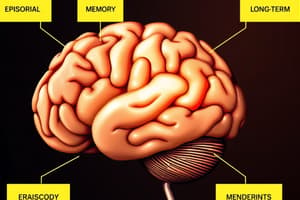Podcast
Questions and Answers
Which type of memory requires no or little cues available for retrieval?
Which type of memory requires no or little cues available for retrieval?
- Explicit Memory - Recall (correct)
- Procedural Memory
- Explicit Memory - Recognition
- Implicit Memory
Recognition tasks rely heavily on retrieval paths being available.
Recognition tasks rely heavily on retrieval paths being available.
True (A)
What is the term for the facilitation of response due to prior exposure to a stimulus?
What is the term for the facilitation of response due to prior exposure to a stimulus?
Priming
In indirect memory tasks, the completion of a word stem is referred to as __________.
In indirect memory tasks, the completion of a word stem is referred to as __________.
Match the following terms with their definitions:
Match the following terms with their definitions:
What is the primary characteristic of long-term memory compared to working memory?
What is the primary characteristic of long-term memory compared to working memory?
Ebbinghaus studied meaningful syllables to research long-term memory.
Ebbinghaus studied meaningful syllables to research long-term memory.
What is the term used to describe the phenomenon where memory retrieval is enhanced when encoding and retrieval conditions match?
What is the term used to describe the phenomenon where memory retrieval is enhanced when encoding and retrieval conditions match?
Ebbinghaus found that we lose about half of the new information we learn in a _____
Ebbinghaus found that we lose about half of the new information we learn in a _____
Match the following memory concepts with their definitions:
Match the following memory concepts with their definitions:
In the context of memory, what does 'savings' refer to?
In the context of memory, what does 'savings' refer to?
What is an example of an indirect memory task based on word recognition?
What is an example of an indirect memory task based on word recognition?
Context-dependent learning indicates that memory performance is not influenced by environmental conditions.
Context-dependent learning indicates that memory performance is not influenced by environmental conditions.
Implicit memory is influenced by depth of processing effects.
Implicit memory is influenced by depth of processing effects.
What type of memory is measured by recognizing whether a word was presented in a prior list?
What type of memory is measured by recognizing whether a word was presented in a prior list?
Describe the main finding from Ebbinghaus's research on forgetting.
Describe the main finding from Ebbinghaus's research on forgetting.
The study by Jacoby and Dallas provided evidence for different types of long-term memory stores by demonstrating the effects of ____ on explicit memory.
The study by Jacoby and Dallas provided evidence for different types of long-term memory stores by demonstrating the effects of ____ on explicit memory.
Match the following terms with their descriptions:
Match the following terms with their descriptions:
In Jacoby & Dallas's study, what did the Implicit memory task involve?
In Jacoby & Dallas's study, what did the Implicit memory task involve?
The term 'faster reaction time' refers to an implicit memory effect seen in repetition priming.
The term 'faster reaction time' refers to an implicit memory effect seen in repetition priming.
Name one physiological or emotional reaction that is a characteristic of Classical Conditioning.
Name one physiological or emotional reaction that is a characteristic of Classical Conditioning.
Which type of memory is characterized by sensory details, time, and personal experiences?
Which type of memory is characterized by sensory details, time, and personal experiences?
Semantic Memory is associated with sensory details and sources of memory.
Semantic Memory is associated with sensory details and sources of memory.
What process describes the facilitation of response time due to prior exposure to a stimulus?
What process describes the facilitation of response time due to prior exposure to a stimulus?
Higher frequency words have higher __________ rates compared to low frequency words.
Higher frequency words have higher __________ rates compared to low frequency words.
Match the following types of memory with their characteristics:
Match the following types of memory with their characteristics:
In what circumstance is sub-threshold activation of learned material most likely to occur?
In what circumstance is sub-threshold activation of learned material most likely to occur?
Spreading activation occurs only when individuals are consciously aware of it.
Spreading activation occurs only when individuals are consciously aware of it.
What is the term used for the connections that are strengthened between the context and the learned material?
What is the term used for the connections that are strengthened between the context and the learned material?
Which type of amnesia involves the inability to store and/or retrieve new explicit information?
Which type of amnesia involves the inability to store and/or retrieve new explicit information?
People with amnesia have impaired implicit memory.
People with amnesia have impaired implicit memory.
Name one cause of retrograde amnesia.
Name one cause of retrograde amnesia.
The 'False Fame' study was conducted by __________.
The 'False Fame' study was conducted by __________.
Match the following terms with their definitions:
Match the following terms with their definitions:
In the Bechara et al., 1995 study, what type of memory was impaired in the patient with hippocampus damage?
In the Bechara et al., 1995 study, what type of memory was impaired in the patient with hippocampus damage?
A person with damage to the amygdala retains both explicit memory and implicit memory.
A person with damage to the amygdala retains both explicit memory and implicit memory.
What is the main role of the hippocampus in memory?
What is the main role of the hippocampus in memory?
Flashcards are hidden until you start studying
Study Notes
Long Term Memory
- Long Term Memory stores all knowledge
- LTM has theoretically unlimited capacity and duration
- LTM is difficult to access
- Working memory (WM) has limited capacity (7 +/- 2)
- WM is a transient store that lasts approximately 1 minute
Ebbinghaus
- Ebbinghaus is the founder of scientific research on LTM
- Ebbinghaus used nonsense syllables to minimize prior knowledge
- Ebbinghaus used CVCs (Consonant-Vowel-Consonant) to represent nonsense syllables
- Ebbinghaus used himself as a subject measuring relearning time intervals
Savings
- Reviewing material prevents forgetting
- Higher review rates lead to stronger memories
Encoding Specificity
- Memories are best retrieved when encoding conditions match retrieval conditions
- Memories are information rich, consisting of learning material and learning context
- Context can be internal (mental, physiological) or external (location, surroundings)
Spreading Activation
- Connections between context and learned material are strengthened through learning
- The use of cues (context) during testing sub-threshold activates the material in LTM, helping retrieval
- Higher frequency words have a higher resting activation rate
Priming
- Priming is the facilitation of a response due to prior exposure of a stimulus
- Priming does not require conscious awareness
- Repetition Priming occurs when the second presentation of a stimulus is faster and more accurate
Explicit Memory
- Explicit Memory is conscious and declarative
- Episodic memory is tied to sensory details, time, and source of memory
- Semantic memory is general knowledge and is not tied to sensory details or time
Explicit Memory Testing
- Recall requires producing items/info with little cues
- Recognition requires identifying items/info with provided cues
Implicit Memory
- Implicit memory is unconscious and non-declarative
- Implicit memory can be tested using indirect measures
Procedural Memory
- Part of implicit memory that involves motor skills and habits
Implicit Memory Testing
- Priming is the facilitation (e.g.Reaction Time, Accuracy) of a response to a stimulus or related stimulus due to prior exposure to the stimulus.
- Repetition Priming is faster and more accurate when a stimulus is presented a second time
- Stem/Fragment Completion (e.g. complete this word "CLA-") leverages prior word exposures.
- Word Naming involves measuring the speed at which words presented in a list are spoken
- Lexical Decision involves measuring the reaction time to identifying a word
Perceptual Learning
- Improvements in perceptual ability over time can be seen in novices and experts in tasks involving speech sounds, face recognition, and taste
Classical Conditioning
- Involves the pairing of a neutral stimulus with a conditioned stimulus
- Can lead to physiological and emotional reactions
Jacoby & Dallas
- Jacoby & Dallas demonstrated separate LTM stores for explicit and implicit memories through a double dissociation
- Their work shows that depth of processing affects explicit memory, but not Implicit Memory.
Double Dissociation
- A disruption in one cognitive process but with no impairment in another
- A reciprocal pattern of disruption (e.g. Patient HM had a disruption in explicit memory, but intact implicit memory.)
Retrograde Amnesia
- Loss of Explicit memory of past events
- Can occur from brain damage, disease, or trauma
- Associated with the psychiatric disorder "fugue"
Anterograde Amnesia
- Inability to store and retrieve new memories
- Involves the inability to remember new things for more than 1 minute without rehearsal
- Damage to the hippocampus (e.g., H.M.) is a common cause
- Korsakoff’s syndrome is caused by a deficiency in thiamine (vitamin B1)
Amnesia and Dissociation
- Amnesia demonstrates a distinction between explicit and implicit memory
- People with amnesia can show functional implicit memory
Bechara et al., 1995
- A double dissociation was demonstrated between explicit and implicit memory
- Patient 1 (P1) had damage to the hippocampus with an intact amygdala (like H.M.)
- Patient 2 (P2) had damage to the amygdala with an intact hippocampus (like MH)
- Both patients were classically conditioned with a blue light and a boat horn
- Explicit memory was tested by asking participants questions about the blue light
- Implicit memory was tested by measuring participants' fear response to the blue light
- The double dissociation was demonstrated when P1 had implicit memory but no explicit memory, whereas P2 showed explicit memory with no implicit memory.
Feelings of Familiarity
- “False Fame” Study suggests that feelings of familiarity can be mistaken for recognition.
- Participants were presented with non-famous names and were asked to rate their fame. Some participants showed that they were able to remember the non-famous name (e.g. "This name sounds familiar") and were likely to mislabel them as famous.
Studying That Suits You
Use AI to generate personalized quizzes and flashcards to suit your learning preferences.




